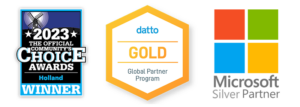Traditional backup methods, such as tape, disk, or online only, are no longer sufficient. In fact, leading edge business owners are finding them unacceptable, due to their inability to recover data quickly and mitigate downtime. Technological innovations have established a comprehensive new standard, Intelligent Business Continuity (IBC). Only an IBC solution will ensure data protection, data security, instant recovery, mitigate downtime and ensure continuity.
Traditional Backup
- Can take weeks to recover data after a disaster occurs, if the data is recoverable
- High risk of failure due to heavy manual administration: 58% of downtime is due to human error
- Difficult to test if a backup is working properly
- Time consuming and expensive to make a copy of, and store, backups in multiple locations. 61% of SMBs still ship tapes to an off-site location
- Backup speeds are slower
- Difficult to prioritize important data, files and applications
- Physical to virtual conversions can be time consuming and have a high failure rate
- Data and backups are at risk when based in only one location, either local OR in the cloud
- Limited options for encrypting data, may not pass industry regulations (i.e., HIPAA, SOX)
- Tape failure rates can exceed 50%
- Potential for theft of loss of media
- Perceived cost savings are deceiving–average cost of downtime is $163,674 per hour
Intelligent Business Continuity
- Downtime after a disaster is reduced to hours, minutes, or even seconds
- Fully automated backup process—very little manual management required
- Automated screenshots are taken of each image-based backup, to verify a successful backup
- Each image-based backup is automatically saved in multiple locations for redundancy; local appliance and secure data centers
- Quick and efficient transfer of files to off-site data centers, even with low bandwidth or busy networks
- Critical data can be prioritized, to be transferred offsite first
- Instant virtualization in mere seconds, due to both proprietary technology and already saved VMDKs
- Avoid risk of downtime from a local disaster, as backups are stored in both local device AND secure cloud
- AES 256 and SSL key-based encryption ensures data is safe both at rest and in transit, to meet industry regulations (ie. HIPAA, SOX)
- Minimal risk of corrupted backups or data loss
- Off-site backups stored in SSAE16 Type II data centers, ensuring security
- The ability to keep your business running in the event of disaster has immeasurable value
Information courtesy of datto. Click here to download the PDF.
How We Approach Managed Services
Our client’s journey with us often begins with a single fix. With minimal downtime, our techs will build a backup solution for your business and accommodate its specific needs. We welcome this opportunity to build trust and to evaluate which issue should be addressed next.
We take a long-term approach to technology solutions. Our goal is to streamline the technology your business uses and to remove complications in its network. To achieve that, we focus on hardware and equipment upgrades, data organization, cloud-based server and software adaptation, and network rebuilds.
Contact us today to learn how our Managed Services can help your business.

President / Network Architect
Mark Kolean always had a fascination with technology from the time he was 3 and his gift of the Atari 2600 to current. In 1990 at the age of 14 Mark got his first job in customer support for a mail order business supporting Tandy TSR-80 computer software shipped on cassette tape. A few years later Mark was building hundreds of 286, 386, and 486 computers for the new emerging DOS & Windows 3.1 computers that had exploded on the market.
After a college career studying business and technology Mark Started Shoreline Computer Systems in 1999 at the height of the dot.com boom with the looming crisis of the year2k bug just around the corner. In the early 2000’s a lot of work was done with early network systems including Lantastic, Novell, and Windows NT Server. Mark became a community contributor to the Small Business Specialist community that revolved around Small Business Server 2000-2011 which focused on single or dual server environments for businesses up to 50 in size. Networks during this time frame mostly had a break fix relationship in which work was billed only when a problem occurred.
In the 2010’s Microsoft released their first cloud based software called Microsoft BPOS which would in later become known as Microsoft Office 365. This introduced a new model in technology with pay as you go subscription services. Starting in 2013 Mark’s team at Shoreline Computer System rebranded as Shoreline Technology Solutions to focus on the transition to become proactive and less reactive to data backup and security needs. Starting in 2018 all customers are required to have a backup management plan in place as a center point with the full understanding that if STS isn’t watching the customer’s data, then no one is.
Now in Mark’s 22 years of business he is building a company emphasis of how to help customers retire servers and build networks completely in the cloud.


Leave a Reply
You must be logged in to post a comment.